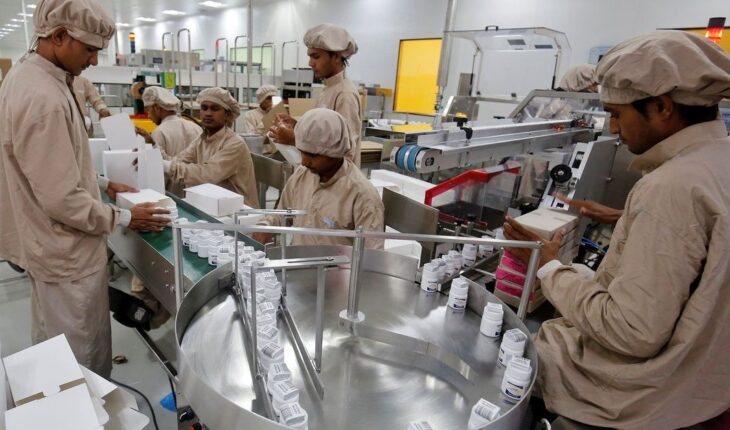Annual Report 2020-21 of the Department of Pharmaceuticals stated that pharmaceutical sector in India contributes around 1.72% to the Gross Domestic Product (GDP) of India. Indian Pharmaceutical Alliance (June 2019) cited estimates that the pharmaceutical industry directly and indirectly provides employment to over 2.7 million people. Same number was cited by another report, Reimagining pharma and healthcare for India @100 by OPPI and EY Parthenon in November 2023. Pharmaceutical industry provides employment in high-skill areas such as R&D, manufacturing, marketing, regulatory etc. Data pertaining to top ten pharmaceutical companies in India reveals that pharmaceutical companies provide significant employment in ‘non-permanent category’ for employees as well as workers. For example, in Sun Pharma, the largest pharma company India had 24.58 per cent employees & workers in ‘Other than Permanent’ category.
Data regarding employees and workers of top 10 listed pharmaceutical companies in India in terms of market capitalization provide the glimpse of employment generated by pharmaceutical sector.
Sun Pharmaceutical Industries Limited, the largest pharmaceutical company in India has 43,000+ global employee base out of which 3,000+ employees form global R&D team. In 2023-24, the company’s headcount grew by over 4 per cent. The company has a diverse and multicultural workforce representing more than 50 nationalities. Consolidated financial statements reveal the list of entities comprise 117 entities including subsidiaries, a joint venture entity, associates and subsidiaries of associates. Sun Pharma had 8 differently abled employees as permanent and 28 differently abled permanent workers. Females form 9.71 per cent of permanent employees, and 37.13 per cent of Other than permanent employees.
Divi’s Laboratories is the largest API manufacturer in the world for 10 of the Generic APIs manufactured. The company has about 17,500 employees across 3 countries including 600 scientists working in three R&D centres across functions as on March 31, 2024. About 10 per cent employees are women employees. Average age of employees was 30.34 years in 2023-24. The company employed 17 differently abled employees in permanent positions, and 11 workers in ‘Other than Permanent’ category.
Cipla Limited has presence in 17 countries with 27,764 permanent employees and workers headcount as on March 31, 2024 including nine differently abled employees and workers. Gender statistics reveal that females form 25 per cent of permanent employees in Top Management, 13.97 per cent in Senior Management, 13.46 per cent in Middle Management, 14.84 per cent in Junior management, 29.66 per cent among Associates/Non-Management, and 18.28 per cent in Indian Subsidiaries of the company.
Torrent Pharma had the total employee strength of 16,056 at the end of FY 2023-24. There was an increase of 649 employees as against 15,407 at the end of FY 2022-23. The company had 782 scientists and 167 support staff in R&D function. More than 28 per cent of scientists at R&D facility were females. Over 23 per cent of Corporate Office workforce consisted of females. There were 19 companies listed as holding, subsidiary, associates (including joint ventures) by Torrent Pharma. The company employed 27 differently abled employees.
Zydus Lifesciences Limited had 26,921 permanent employees and workers in total including 187 differently abled employees and workers. In other than permanent employees and workers category, the company had differently abled employees (10), and workers (09). The company had over 1,400 researchers across its 8 R&D centres.
Dr. Reddy’s Laboratories (DRL) Limited had 26,343 employees and 643 workers in Permanent category as per their Integrated Annual Report of 2023-24 including 3,335 R&D scientists employed in 8 R&D facilities. 6,281 employees have been onboarded in FY2024 alone. Number of employees in permanent category included 104 differently abled employees, in addition to 22 differently abled employees and 21 differently abled workers in ‘Other than Permanent’ category. Female constituted 19.8 per cent of permanent employees and 33.4 per cent of Other than Permanent employees.
Table 1: Employees in Top 10 Pharmaceutical Companies in India (FY 23-24)
| Name of the Company | Employees | Workers | Total (Permanent) | ||||
| Permanent | Other than Permanent | Total | Permanent | Other than Permanent | Total | ||
| Sun Pharma | 14,760 | 1,239 | 15,999 | 4,770 | 5,125 | 9,895 | 19,530 |
| Divi’s Labs | 9,683 | 1,424 | 11,107 | 58 | 6,359 | 6,417 | 9,741 |
| Cipla | 27,379 | 4,917 | 32,681 | 385 | 8,312 | 8,697 | 27,764 |
| Torrent Pharma | 14,066 | 285 | 14,351 | 565 | 2,355 | 2,920 | 14,631 |
| Zydus Lifesci. | 21,649 | 73 | 21,722 | 5,272 | 2,481 | 7,753 | 26,921 |
| DRL | 26,343 | 8,226 | 34,569 | 643 | 8,657 | 9,300 | 26,986 |
| Lupin Ltd. | 19,653 | 442 | 20,095 | 1,059 | 295 | 1,354 | 20,712 |
| Mankind Pharma | 18,428 | 0 | 18,428 | 1,112 | 0 | 1,112 | 19,540 |
| Aurobindo Pharma | 26,015 | 0 | 26,015 | 0 | 11,581 | 11,581 | 26,015 |
| Alkem Labs | 15,611 | 232 | 15,843 | 1,821 | 3,393 | 5,214 | 17,432 |
Source: Annual Reports of respective pharmaceutical companies (2023-24)
Lupin Limited has given detailed information about global workforce, global workforce (North America), and global workforce (ROW). R&D team headcount as on March 31, 2024 was 1,400+. The company also provided the number of permanent employees at different managerial levels which helps in understanding number of positions at different hierarchical levels.
Mankind Pharma had a total workforce of 23,279 (including 534 females) in FY24 as against 22,000 in FY23. Out of total workforce, the company had 19,540 permanent employees on the rolls as on March 31, 2024. The company had a retention rate of 90 per cent for employees associated for more than 5 years. About 7,000 employees of the company have been associated with the company for more than 5 years. The company had 12,255 MRs in FY24 as against 11,691 MRs in FY23. The company had 3,788 Field Managers in FY24 as against 3,561 Field managers in FY23. The company employed just 2 differently abled employees.
Aurobindo Pharma had 37,596 global workforce including both permanent and contractual workers as the company has multiple subsidiaries. Women employees form 12.54 per cent of total strength. The company’s workforce comprised 26,015 permanent employees and 11,581 contractual workers in FY24 as compared to 23,453 permanent employees in FY23. The company employed 12 differently abled employees in permanent capacity and 5 workers in ‘Other than Permanent’ group. R&D team size is of 1,500+ scientists and analysts in 9 research facilities.
Alkem Labs had 17,277 permanent employees on its rolls as on March 31, 2024. But for the financial year, the number of permanent employees stood at 15,611 and permanent workers at 1,821. The company employed 3 differently abled employees as permanent employees, 3 as permanent workers and 3 workers in Other than Permanent category. Alkem Labs had about 665 scientists onboard across 4 R&D facilities.
Top Management and Senior Management positions in Cipla form 0.76 per cent of total managerial level positions including top management, senior management middle management and junior management. This does not include positions in Indian subsidiaries of the company. Senior Management comprising 233 employees form about 1.19 per cent of all managerial level positions in Lupin.
Some of these top pharmaceutical companies have started sharing the data on job creation in smaller towns by disclosing percentage (%) of the total wage cost. For example, Torrent Pharma reported that wages paid to persons employed in rural location formed 20 per cent of total wage cost. This percentage was 30 per cent for Semi-Urban location, 21 per cent for Urban, and 29 per cent for Metropolitan in FY2023-24.
Pharmaceutical companies in India differ with respect to their focus such as focus on APIs/bulk drugs by Divi’s Labs, or Over the Counter (OTC) products by Mankind Pharma. Similarly, R&D intensity differs for each company as reflected in the number of scientists employed. Therefore, employment pattern varies across the sector. Additionally, diversity and inclusion get reflected in hiring practices as hiring efforts include female employees thereby recognizing the importance of gender diversity across all functions, and employment of differently abled persons.
Dr. Anil Kumar Angrish-Associate Professor,Department of Pharmaceutical Management, NIPER S.A.S. Nagar (Mohali), Punjab
*Disclaimer: Views are personal and do not represent the views of the Institute.




